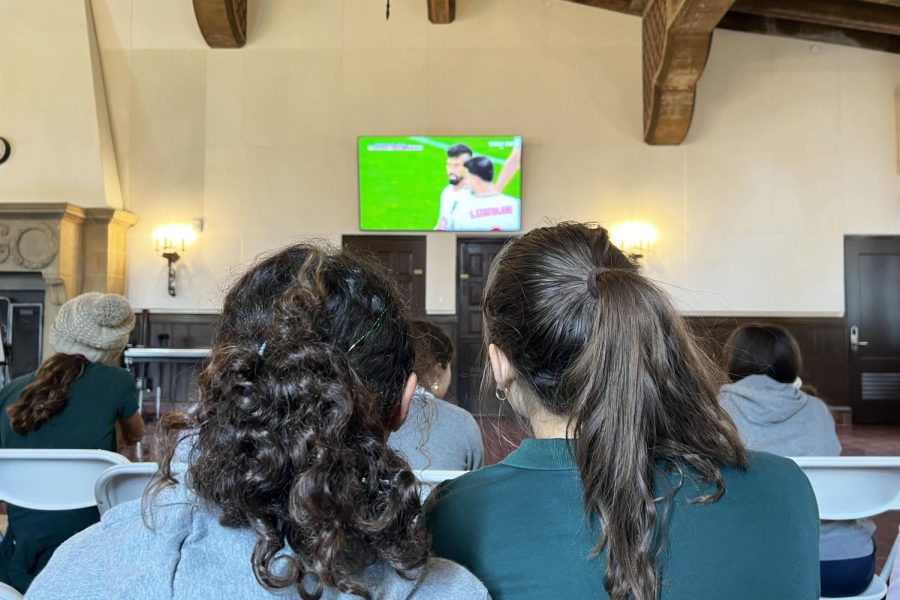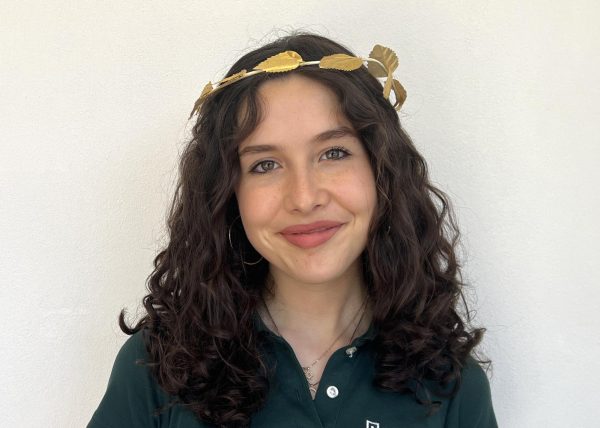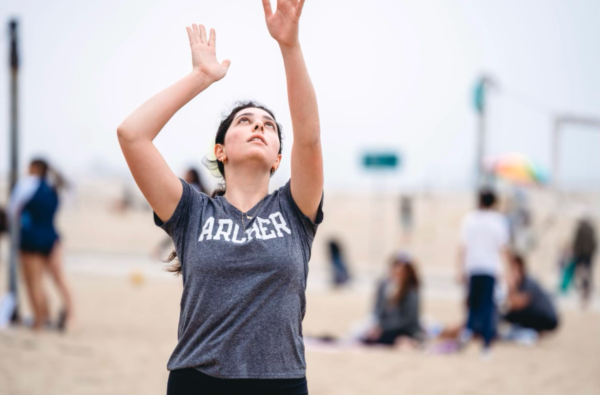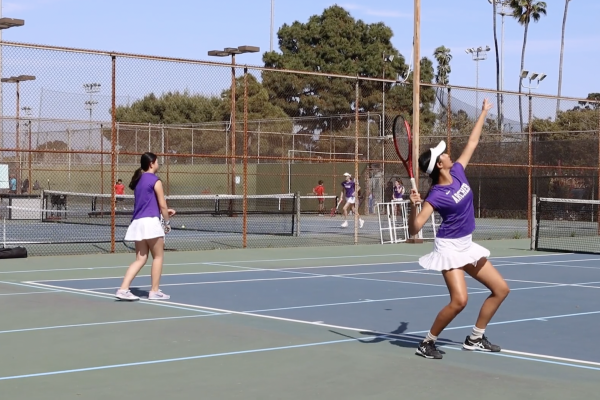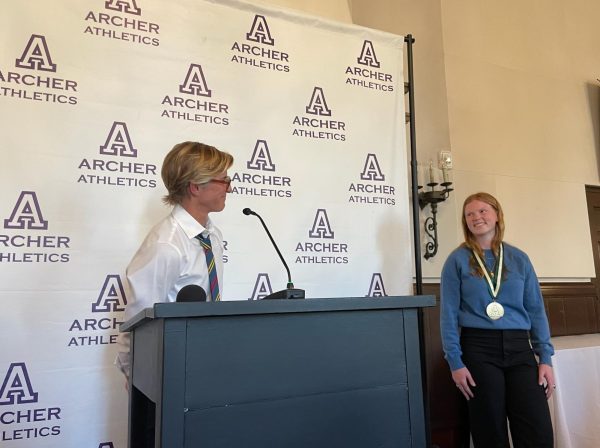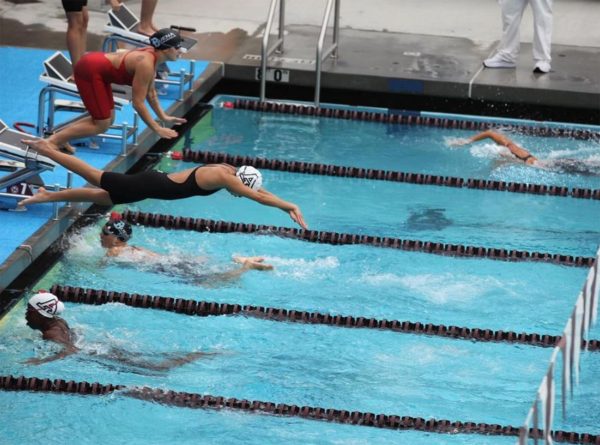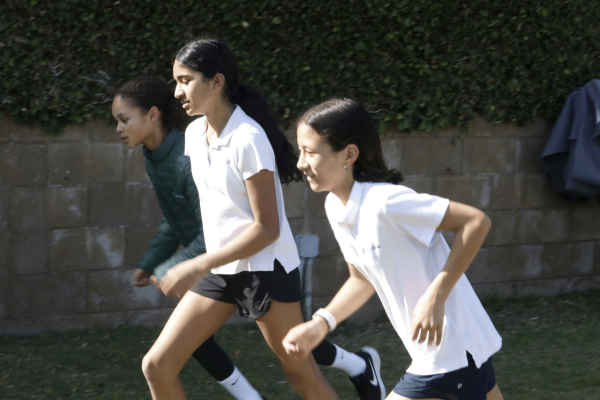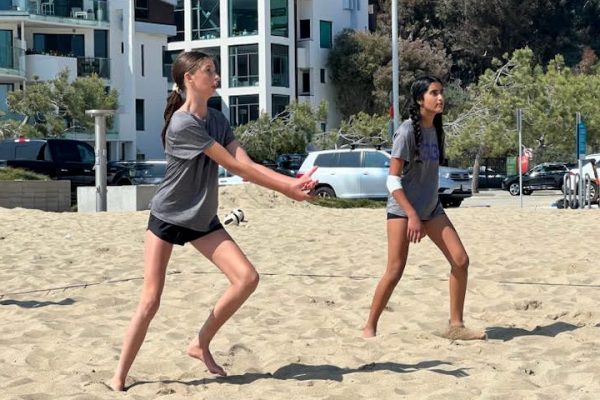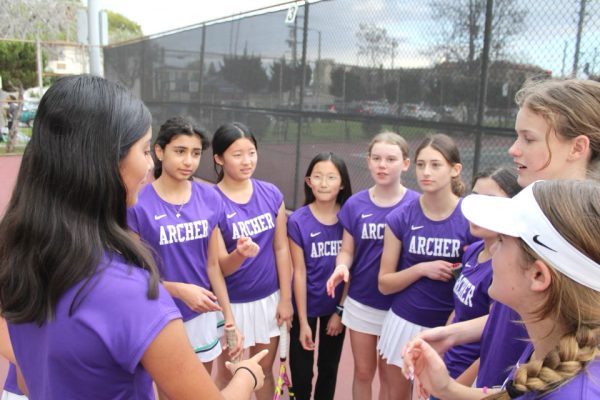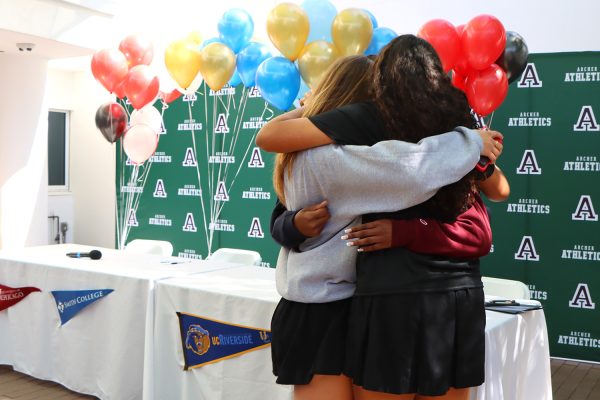World Cup inspires Archer’s diversity, connectivity
Photo credit: Lucy Williams
Freshmen Sara Salehi and Julia Ong watch the USA v Iran World Cup game Nov. 29 in the dining hall. The Archer community has been closely following each bracket of games in anticipation of the winning team.
December 12, 2022
Eyes shifted from math homework to phone screens as students all over campus streamed the games of the Qatar World Cup. For the last three weeks, Archer’s halls have filled with high energy over the excitement of the tournament. Community members loyal to diverse countries celebrate or pity the national soccer teams fighting through tournament brackets.
Athletic Director Kim Smith’s experience playing and coaching soccer cultivated her great interest in the World Cup. She streamed the Iran versus USA game on Nov. 29 in the Zeller Student Center, where excited students even asked to go watch during academic classes. During lunch, many gathered to watch the game and make predictions on which team would win.
“The World Cup is one of the greatest unifiers,” Smith said. “As members of the human race, whether you’re a soccer fan or not, you get to wave a flag. You get to link arms with your neighbor. You get to root for your home country. You get to connect on a global scale. We got to do that in the Archer dining hall. It was amazing to see students passionately rooting for their country.”
As members of the human race, whether you’re a soccer fan or not, you get to wave a flag. You get to link arms with your neighbor. You get to root for your home country. You get to connect on a global scale. We got to do that in the Archer dining hall.
— Kim Smith
History teacher Nicholas Graham has been playing soccer since he was 7 years old. He grew up in England, where the sport is very popular, and he moved to the United States in 2013. The earliest World Cup he can remember is Mexico 1986.
“I remember watching it on a tiny little color TV with a big back. My family in Spain was big into football, and my mother’s first cousin played for Barcelona,” Graham said. “I love football. I’ll always watch a game — from AYSO girls under 12 to the World Cup Finals. It gives me the same level of intensity and enjoyment.”
Graham said he was fascinated by Morocco, Tunisia, and Cameroon’s wins, saying they bring hope to African countries competing in the tournament.
“Established powerhouse teams have always dominated teams from Asia, Africa or the Middle East,” Graham said. “Those teams traditionally haven’t done so well, but this year they’re really sticking to it. Morocco beat Belgium, who were semifinalists in the last World Cup. In Morocco’s capital, there are wild scenes of jubilation.”
The World Cup unveils Archer’s diversity, as many students support teams of nationalities beyond the United States. Students with foreign connections are invested in the tournament as they follow the progress of their country in the Cup.
“My nanny is from Mexico. Since we were young, she has always played the World Cup games on TV,” Patil said. “Especially this year, my siblings and I have gotten really into all the games and watching Mexico and the United States play.”
Graham said this year’s World Cup is different for two reasons. It’s the first World Cup that’s been held in the Middle East — a huge moment for the historically neglected region — putting an Arab country in the world’s spotlight.
It’s also the first World Cup held in November since Qatar’s summer temperatures are too high to play the tournament in the summer per tradition. This fall tournament spikes controversy for Europe’s club seasons that traditionally start in August but have paused for the World Cup.
The sensation of the World Cup is greater than a sports tournament, as it ventures into geopolitical affairs. Archer history teachers such as Graham are focusing on this current event with their students.
“It’s important that I make my classes aware of this event because it has very important political ramifications,” Graham said. “Qatar wants to host because it brings enormous geopolitical benefits as a small country that wants to play a major role in global affairs. Three or four billion people will probably tune in for the World Cup final, as it is the biggest event on the planet.”
Under the excitement of this worldwide sensation lies an oppressive truth, one that sophomore Surya Patil said goes unrecognized by most people.
“It’s great that it’s the first time the Cup is being hosted in an Arab country,” Patil said. “However, it’s important to acknowledge the terrible living and working conditions that labor workers had to go through in order to build the stadiums. When it was announced that Qatar would be hosting the World Cup, they didn’t have the equipment, stadiums or infrastructure to house that many teams and fans, so they had to rapidly build the infrastructure needed.”
The occurrence of this quadrennial event has impacted the Archer community, who will be watching closely till the finals on Dec. 18.
“Sports inspire and unite like nothing else,” Smith said. “We get to experience connectivity and hope through the game of soccer. For students to be a part of it is incredibly special.”



